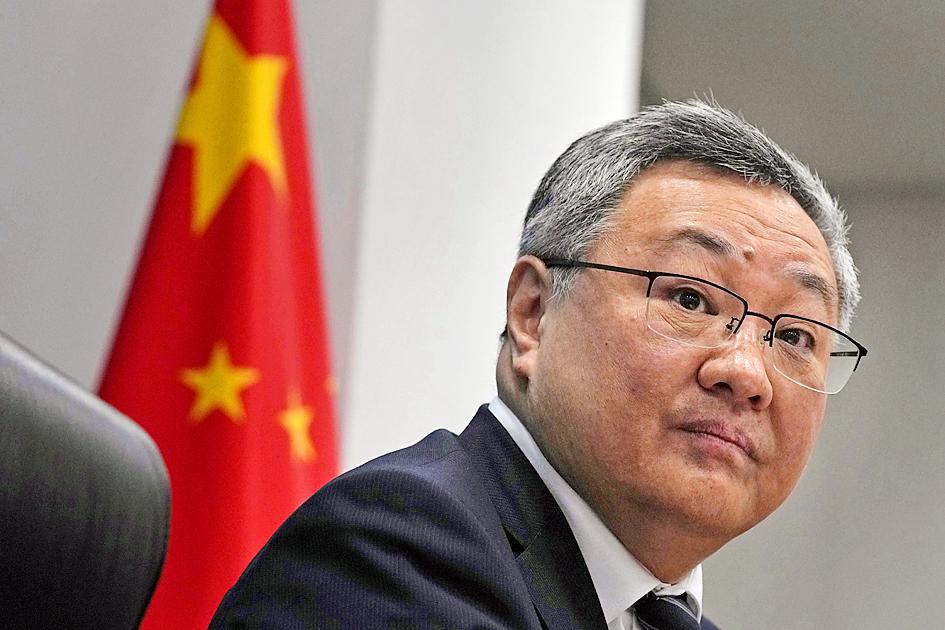China yesterday said that it would continue to “modernize” its nuclear arsenal, while calling on the US and Russia to reduce their own stockpiles a day after global powers pledged to prevent such weapons from spreading.
In a rare joint statement setting aside rising tensions, the US, China, Russia, the UK and France reaffirmed their goal of creating a world free of nuclear weapons and avoiding a nuclear conflict.
The five nuclear powers also committed to full future disarmament from nuclear weapons, which have only been used in conflict in the US bombings of Japan at the end of World War II, but squaring that rhetoric with reality would not be easy at a time of spiraling tensions between those same global powers not seen since the Cold War.

Photo: AP
There are growing global concerns about China’s rapid military modernization, especially after its armed forces last year announced they had developed a hypersonic missile that can fly at five times the spread of sound.
The US has also said that China is expanding its nuclear arsenal to as many as 700 warheads by 2027 and possibly 1,000 by 2030.
China yesterday defended its nuclear weapons policy, and said Russia and the US — by far the world’s largest nuclear powers — should make the first move on disarmament.
“The US and Russia still possess 90 percent of the nuclear warheads on Earth,” Chinese Ministry of Foreign Affairs Department of Arms Control Director-General Fu Cong (傅聰) told reporters. “They must reduce their nuclear arsenal in an irreversible and legally binding manner.”
Fu dismissed US claims that China was vastly increasing its nuclear capabilities.
“China has always adopted the ‘no first use’ policy and we maintain our nuclear capabilities at the minimal level required for our national security,” he said.
However, he said Beijing would “continue to modernize its nuclear arsenal for reliability and safety issues.”
Ties between Beijing and Washington have been strained over a series of issues, including Beijing’s saber-rattling toward Taiwan, which has reached new heights under Chinese President Xi Jinping (習近平), the nation’s most authoritarian leader in a generation.
Fu dismissed speculation over the possibility of deploying nuclear weapons near the Taiwan Strait.
“Nuclear weapons are the ultimate deterrent, they are not for war or fighting,” he said.
While the US and Russia have had a formal strategic stability dialogue since the days of the Cold War, producing several disarmament agreements, that is not the case between Washington and Beijing.
In Europe, tensions with Moscow have deteriorated over a Russian troop buildup close to its border with Ukraine. That has raised fears that the Kremlin, worried by the possibility of further eastward expansion of NATO, is planning a new attack on its neighbor.
Crunch talks between Russia and the US on European security are expected in Geneva, Switzerland, on Monday next week.

COMBINING FORCES: The 66th Marine Brigade would support the 202nd Military Police Command in its defense of Taipei against ‘decapitation strikes,’ a source said The Marine Corps has deployed more than 100 soldiers and officers of the 66th Marine Brigade to Taipei International Airport (Songshan airport) as part of an effort to bolster defenses around the capital, a source with knowledge of the matter said yesterday. Two weeks ago, a military source said that the Ministry of National Defense ordered the Marine Corps to increase soldier deployments in the Taipei area. The 66th Marine Brigade has been tasked with protecting key areas in Taipei, with the 202nd Military Police Command also continuing to defend the capital. That came after a 2017 decision by the ministry to station

‘INVESTMENT’: Rubio and Arevalo said they discussed the value of democracy, and Rubio thanked the president for Guatemala’s strong diplomatic relationship with Taiwan Guatemalan President Bernardo Arevalo met with US Secretary of State Marco Rubio in Guatemala City on Wednesday where they signed a deal for Guatemala to accept migrants deported from the US, while Rubio commended Guatemala for its support for Taiwan and said the US would do all it can to facilitate greater Taiwanese investment in Guatemala. Under the migrant agreement announced by Arevalo, the deportees would be returned to their home countries at US expense. It is the second deportation deal that Rubio has reached during a Central America trip that has been focused mainly on immigration. Arevalo said his

‘SOVEREIGN AI’: As of Nov. 19 last year, Taiwan was globally ranked No. 11 for having computing power of 103 petaflops. The governments wants to achieve 1,200 by 2029 The government would intensify efforts to bolster its “Sovereign Artificial Intelligence [AI]” program by setting a goal of elevating the nation’s collective computing power in the public and private sectors to 1,200 peta floating points per second (petaflops) by 2029, the Executive Yuan said yesterday. The goal was set to fulfill President William Lai’s (賴清德) vision of turning Taiwan into an “AI island.” Sovereign AI refers to a nation’s capabilities to produce AI using its own infrastructure, data, workforce and business networks. One petaflop allows 1 trillion calculations per second. As of Nov. 19 last year, Taiwan was globally ranked No. 11 for

Israel yesterday said it has begun preparations for the departure of large numbers of Palestinians from the Gaza Strip in line with US President Donald Trump’s plan for the territory, while Egypt has launched a diplomatic blitz behind the scenes to try and head off the plan. The Trump administration has already dialed back aspects of the proposal after it was widely rejected internationally, saying the relocation of Palestinians would be temporary. US officials have provided few details about how or when the plan would be carried out. Trump yesterday said that Israel would turn Gaza over to the US after the